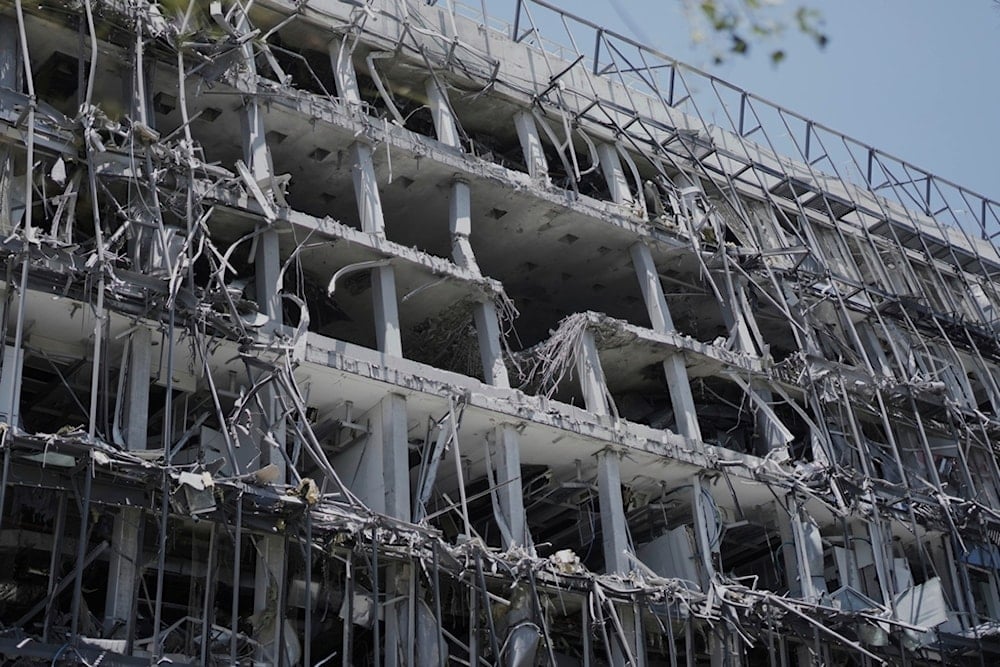Weizmann Institute reels from rising boycotts linked to Gaza genocide
Iran’s recent missile strikes devastated "Israel's" Weizmann Institute, destroying 50 labs.
-

Damage to the Weizmann Institute of Science from an Iranian missile strike in Rehovot, Thursday, June 19, 2025. (AP Photo/Maya Alleruzzo)
The head of the Scientific Council at "Israel's" Weizmann Institute, Nir Davidzon, revealed that the research center suffered heavy destruction during Iran's recent retaliation and is now facing mounting isolation from the international academic community.
In an interview with "Israel's" Channel 12, Davidzon said the institute was struck directly by two Iranian missiles, causing "enormous damage to capital, materials, and experimental results that cannot be reproduced." He confirmed that 50 laboratories were completely destroyed, leaving many students and researchers without equipment or results to continue their work.
Davidzon stressed that the Weizmann Institute, long considered one of "Israel's" most internationally connected scientific institutions, is now being increasingly boycotted by universities and research centers abroad. "Everything that was built over decades is collapsing because of the war in Gaza," he said. "Even good friends are telling us they can no longer work with us."
His concerns reflect a broader trend. In recent months, prestigious institutions in Europe have cut ties with Israeli academia in response to the war in Gaza. Belgium's Ghent University terminated partnerships with three Israeli research bodies, citing violations of its human-rights policy. In the Netherlands, Radboud University ended cooperation with Tel Aviv University and Hebrew University, while Utrecht University suspended new collaborations. Erasmus University Rotterdam also froze ties with several Israeli institutions. These decisions are part of a growing wave of academic and cultural boycotts, signaling "Israel's" deepening isolation in global higher education.
Davidzon added that despite attempts to reassure the scientific community that some Israeli voices share international ethical standards, such efforts have become increasingly difficult, particularly "when the world hears Israeli ministers speaking about burning Gaza."
Weizmann Institute’s Deep Links to Israeli Arms Industry
The Weizmann Institute of Science has well-established ties to the Israeli military sector, with several of its research initiatives overlapping with military applications.
In 2024, the institute signed a cooperation agreement with Elbit Systems, the Israeli occupation largest private arms manufacturer, to develop bio-inspired materials explicitly marketed for defense uses. Independent analyses have also highlighted how Weizmann’s cutting-edge work in areas like artificial intelligence, cybernetics, and drone technologies can be directly leveraged in military R&D, illustrating the dual-use nature of its scientific output.
Beyond direct collaboration, the institute has been part of broader regime-backed initiatives designed to channel academic expertise into weapons development.
Programs such as the Katzir Fellowship recruit young scientists into defense-related research pipelines, underscoring how Israeli academic institutions serve both civilian and military agendas. Analysts note that this blurring of lines has made the Weizmann Institute a legitimate target in the context of regional conflict, as its research contributes not only to scientific advancement but also to Israel’s military and war efforts.
Beyond academia
Davidzon warned that the consequences extend beyond research, noting that many Israeli industries rely on knowledge and expertise that flow through international partnerships. "We are the first to see the results of this boycott," he said, cautioning about the long-term impact on science and industry alike.
The comments follow Iran's Operation True Promise 3 in June, a retaliatory strike for Israeli attacks on Iranian territory that killed civilians, including women and children. The Iranian missile barrage caused widespread damage in Tel Aviv and central "Israel," striking sensitive targets in Haifa, Beer Sabe', and the Naqab.
Read more: Weizmann Institute halves medical school intake after Iranian missile

 4 Min Read
4 Min Read








